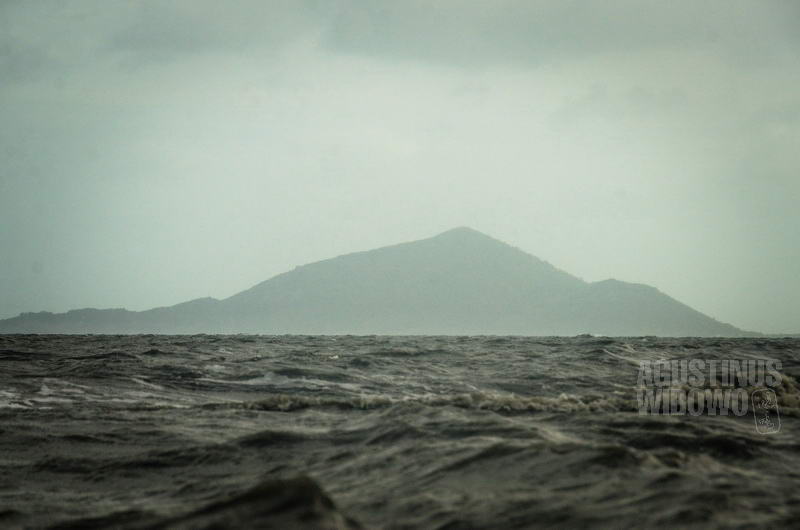The Sea
Over the next few nights, my father revealed his life secrets. In his bedroom that was locked from inside, he recounted the stories in an almost inaudible whispering, as if he worried that the walls may have ears:

Your history books are full of lies. After Suharto replaced Sukarno, Suharto immediately isolated Sukarno in a house arrest in Jakarta until Sukarno died of a terrible and humiliating fate. Now, you say, who is plotting coup against whom? Suharto declared that the communists were rebels, traitors, who must be eradicated. All those who had sympathized with the communist organisations must be killed without exception. Hundreds of thousands, some say even more than a million, were killed without trials, until the rivers turned red with blood and its foetid scent filled the air. Thousands of Chinese were among the victims. I saw a man who laughed with pride as he flaunted the severed ear of a ‘godless communist’s whose body he had maimed in cold blood, believing that he had done his nation and religion a great service. This was the biggest massacre in our history, reported by the American TIME Magazine as ‘The West’s best news for years in Asia’.
One year after he took the power, Suharto planned on implementing the regulation that prohibited the Chinese from doing business in provincial towns and villages. All properties belonging to these ‘foreign’individuals had also to be confiscated by the State, later to be distributed to the natives. This program was first trialled in our province of East Java, or to be more precise, in our hometown of Lumajang.
The heat was scorching that day. I was with thirty-or-so Chinese youths, we stood guarding the home of a fellow Chinese, about to be executed by the government. ‘This is our home, this is our land. Don’t take what is rightfully ours!’ we shouted. Suddenly, from all around us, appeared dozens of rough-looking men wielding sickles, cleavers, and limestone rocks. They shouted back, ‘Where is your home? Where is your land? Go back to where you came from!’
Police arrived, throwing all of us into a small prison cell. This enraged Peking, which raised a strong protest against Jakarta. Radio Peking was fierce in their broadcasting: ‘The Indonesian Military is the puppet of the imperialist America…,After a week had passed, some of us were released. Radio Peking praised our struggle. ‘O youths of the South Sea Current who fought to defend your rights, you are the role models!’
But I was still kept behind bars, along with two other men. We were locked up in a special prison cell, as we were regarded the most revolutionary of the protesters. ‘You’re communist! Admit it!’ Their beatings inflicted upon my back left a stinging, gaping wound, which they then poured salt and vinegar into.
I was released after three hundred and fifty-five days in jail.
The praise from Radio Peking was like oil fuelling our revolutionary flame. We became more devoted in studying every word and thought of Chairman Mao. One day, Chairman Mao’s message was broadcasted through the radio. ‘O knowledgeable youths, you must go up to the mountains and down to the villages, learn from the poor farmers and peasants!’ The message was well received by us here. We indeed went down to the villages, and arrived in remote villages on the coast of the South Sea. And what we saw there? The Chinese there were much smaller in number, powerless, so they just helplessly watched their homes and shops being looted and burned before their very eyes. Many of them were also slaughtered with no resistance.
Chairman Mao also reminded us to ‘Serve the people with heart and soul’. We, the Chinese revolutionary youths of Lumajang, received our call by going to sell goods in those remote villages. The Javanese villagers in fact welcomed us warmly, as the villages were desperately running out of supplies of food and daily needs after the Chinese shops had been forced to close. We pooled what meagre profits we managed to make from the business, to support our Chinese compatriots living in misery in the villages. After all this turmoil had been over, we used the rest of the money to buy gold; we got four hundred grams with that money. This was our common emergency fund, for all of the Chinese community in this town, to prepare, just in case. Who knows, the slaughtering of the Chinese might be repeated again in this country.
Previous Page Next Page






Good job, Buddy. Nice regard from Lumajang.
I love this article ❤️
I wept as i read it 😢
Senang bacanya, juga sedih..
Apa kabar dengan pantai tempat pertama kali mas Agustinus berkenalan dengan samudera di selatan Lumajang itu?
Felt the same.
May i share this?